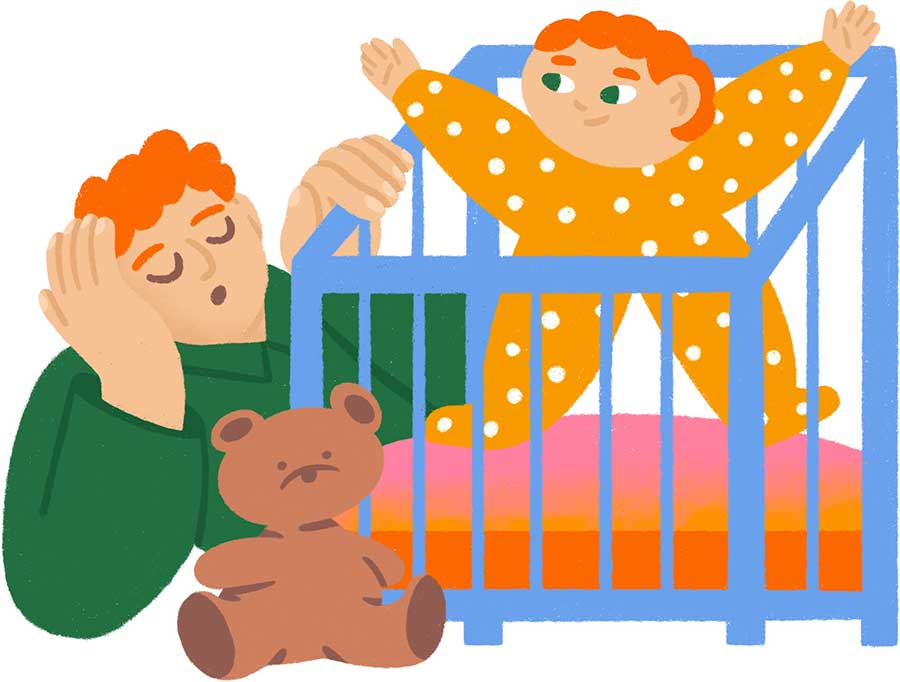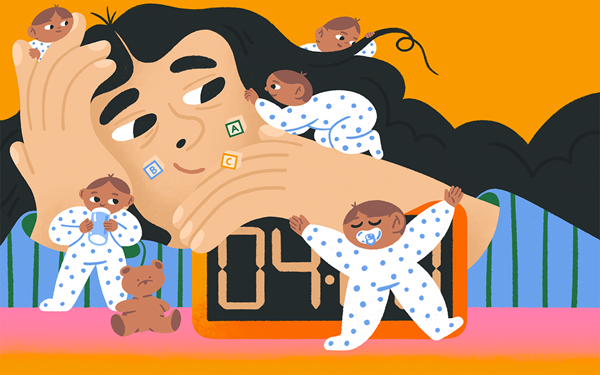When do babies sleep through the night?

All babies have different sleep patterns. How much they need will vary between babies and change according to their age.
Newborn babies
When babies are first born, they often need lots of sleep, but this won’t be in big blocks.
This can mean short bursts of sleep with feeds in between, followed by times when your baby is awake and alert. This will happen in the day and the night, and many babies sleep up to 18 hours daily.
Don’t worry about getting into a strict sleep routine – newborns need to know you're there for them and will respond to their cries.
3 to 6 months old
Babies of this age usually have about 8 hours of sleep overnight, but not in one big block. Things such as teething and hunger can wake them up during the night.
Additionally, most will still need naps during the day.
You don't need a strict routine, but doing the same things in the same order each night can be helpful.
6 to 12 months old
Your baby’s need for sleep changes as they grow. Learning to crawl and growth spurts can both have an impact. They’re likely to need regular night feeds and naps.
Some babies will start to sleep through the night if they haven’t already.
This is the age where consistent bedtime routines really help. Babies need to feel safe, secure, and calm to fall asleep. It’s helpful if this is reflected in your bedtime routine with things like quiet reading, singing, chatting and cuddles.
Some children can be put down awake and will drift off by themselves. But you might need to stay by your baby’s side so they know you’re nearby while they fall asleep. This phase of sitting by them can get gradually shorter over time.
12 to 24 months old
Your baby is becoming a toddler, and their sleeping schedule will change.
They’ll sleep around 11-12 hours per night on average, with naps in the day. This will start reducing a bit as they grow.
Many toddlers will be sleeping through the night. If they aren’t, there’s no need to worry but speak to your health visitor or GP if you’re concerned.
Helping your baby fall asleep at night
Creating a bedtime routine for babies around 3 months and older can help them fall asleep at night. Doing the same things in the same order each night can help your baby understand when it's time for sleep.
This might include:
- quiet play
- a short warm bath
- a story or quiet chat about the day followed by bedtime.
Consistency is key
When you're both tired at the end of the day, having a set routine can help you to stay calm and relaxed. And it helps your baby to get the rest they need.
Making sure your baby is comfortable and safe when sleeping

Young babies can get used to falling asleep by sucking on a bottle or breast.
From 3 months, you could try separating the bedtime feed from your bedtime routine. This can help to avoid wind issues at bedtime and teach them to fall asleep without sucking.
From when your baby is born up to 6 months, they need to share your room when they sleep.
Place your baby on their back to sleep. Make sure their feet are at the foot of the cot or Moses basket.
Their sleeping space should be clear, with no pillows, bumpers, pods, nests or sleep positioners.
The room should be around 18 degrees, but you’ll also need to consider what your baby is wearing and any blankets they have so you can make sure they’re not too hot or too cold.
Keep your baby’s head uncovered. Make sure their blanket's tucked in and no higher than their shoulders.
Remember never to sleep on a sofa or in an armchair with a baby. This increases the risk of sudden infant death by up to 50%.
Why won't my baby sleep?
There are lots of reasons babies don't sleep – it can vary from baby to baby and depends on their age. You might want to check:
- if the room is the right temperature (around 18 degrees)
- you have a consistent bedtime routine in place
- for babies around six months and older, you include quiet activities like reading, singing and chatting as part of the bedtime routine
- whether sitting with them for a while helps them drift off
- you have separated the bedtime feed from your baby’s bedtime routine.
If you’re concerned about changes in your baby’s sleep pattern or behaviour, speak to your health visitor or GP.
Co-sleeping
When you sleep and share your bed with your baby for most of the night, and not just for comfort or feeding your baby, this is known as co-sleeping.
Many parents find that sleeping in close contact settles the baby and can mean the whole family rest better.
When co-sleeping, there’s a risk that an adult could roll over and suffocate a baby. Risks associated with co-sleeping increase when a parent has been using drugs or drinking, or if a parent is a smoker. For this reason, it’s safer to place their cot by your bed or for you to have a mattress next to your baby’s cot.
If you co-sleep, speak to a health professional and follow their advice to make sure it’s as safe as possible.
Where to get support
Ask your health visitor or GP for advice. Or talk to other parents and carers who'll all have their own ways of settling their babies. Their suggestions could work for yours, too.
The Lullaby Trust is a UK charity that provides advice on safer sleeping for babies as well as information on Sudden Infant Death Syndrome (SIDS). You can contact them on 0808 802 6868.
You can help us to support more families.
Get more parenting advice
Illustration credits
Top banner and page body illustrations by Janice Chang.
Parenting advice row: see individual pages for details.





